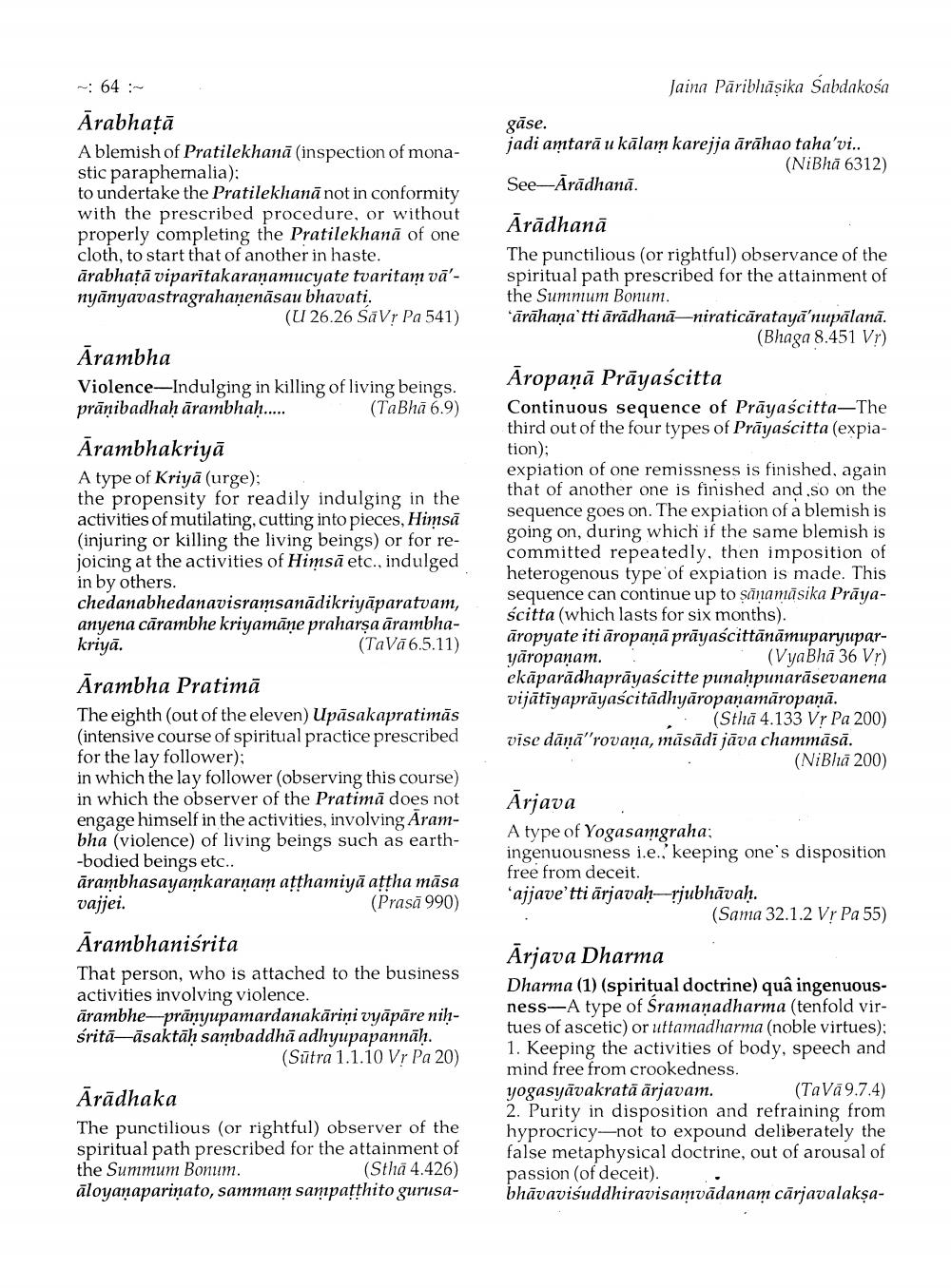________________
- 64 :
Jaina Pāribhāșika Sabdakosa
Ārabhatā A blemish of Pratilekhanā (inspection of monastic paraphernalia): to undertake the Pratilekhanā not in conformity with the prescribed procedure, or without properly completing the Pratilekhanā of one cloth, to start that of another in haste. ārabhatā viparītakaraṇamucyate tvaritam vā'nyānyavastragrahaņenāsau bhavati.
(U 26.26 SãVr Pa 541)
gāse. jadi amtarā u kālam karejja ārāhao taha'vi..
(NiBhā 6312) See-Arādhanā. Ārādhanā The punctilious (or rightful) observance of the spiritual path prescribed for the attainment of the Summum Bonum. 'ārāhana'tti ārādhanā—niraticāratayā'nupālanā.
(Bhaga 8.451 Vr)
Ārambha Violence-Indulging in killing of living beings. prāṇibadhaḥ ārambhaḥ.....
(Tabhā 6.9)
Ārambhakriyā A type of Kriyā (urge); the propensity for readily indulging in the activities of mutilating, cutting into pieces, Himsā (injuring or killing the living beings) or for rejoicing at the activities of Himsā etc., indulged in by others. chedanabhedanavisramsanädikriyāparatvam, anyena cārambhe kriyamāne praharsa ārambhakriya.
(TaVā6.5.11)
Aropaņā Prāyaścitta Continuous sequence of Prāyaścitta—The third out of the four types of Prāyaścitta (expiation); expiation of one remissness is finished, again that of another one is finished and so on the sequence goes on. The expiation of a blemish is going on, during which if the same blemish is committed repeatedly, then imposition of heterogenous type of expiation is made. This sequence can continue up to şanamasika PrāyaŚcitta (which lasts for six months). āropyate iti āropaņā prāyascittānāmuparyuparyāropanam.
(Vyabhā 36 Vr) ekāparādhaprāyascitte punahpunarāsevanena vijātiyaprayascitādhyāropanamáropanā.
(Sthā 4.133 Vr Pa 200) vise dāņā"rovana, māsādi jāva chammāsā.
(NiBhā 200)
Arjava
Arambha Pratimā The eighth (out of the eleven) Upāsakapratimās (intensive course of spiritual practice prescribed for the lay follower); in which the lay follower (observing this course) in which the observer of the Pratimā does not engage himself in the activities, involving Arambha (violence) of living beings such as earth-bodied beings etc.. ārambhasayamkaraṇam atthamiyā attha māsa vajjei.
(Prasā 990) Ārambhanisrita That person, who is attached to the business activities involving violence. ārambhe-prānyupamardanakāriņi vyāpāre nihsritā—āsaktāḥ sambaddhā adhyupapannāh.
(Sūtra 1.1.10 Vr Pa 20)
A type of Yogasamgraha; ingenuousness i.e. keeping one's disposition free from deceit. ‘ajjave'tti ārjavah-rjubhāvah.
(Sama 32.1.2 Vr Pa 55)
Arjava Dharma Dharma (1) (spiritual doctrine) quâ ingenuousness-A type of Sramanadharma (tenfold virtues of ascetic) or uttamadharma (noble virtues): 1. Keeping the activities of body, speech and mind free from crookedness. yogasyävakratā ārjavam. (TaVä 9.7.4) 2. Purity in disposition and refraining from hyprocricy-not to expound deliberately the false metaphysical doctrine, out of arousal of passion (of deceit). bhāvavisuddhiravisamvādanam cărjavalaksa
Ārādhaka The punctilious (or rightful) observer of the spiritual path prescribed for the attainment of the Summum Bonum.
(Sthā 4.426) āloyanaparinato, sammam sanipatthito gurusa




